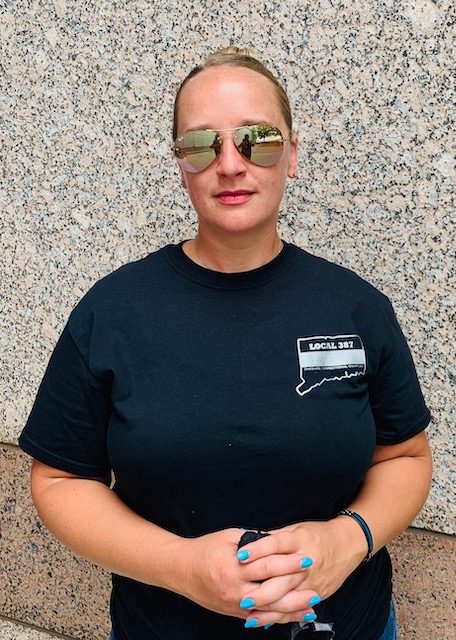
HARTFORD, Conn. – It did not take long for the COVID-19 crisis to hit home for Ginny Ligi, an eight-year correction officer at the Cheshire Correctional Institution. In early April, she tested positive for the novel coronavirus.
“The virus literally knocked me off my feet for three weeks,” said Ligi, the union secretary for AFSCME Local 387 (Council 4). “It was like I had vertigo on top of not being able to breathe well.”
To add insult to injury, Ligi returned to work only to discover that her workers’ compensation claim – and those of her fellow correction officers who had contracted the virus – would be denied.
Like a good union activist, she turned her anger into action, becoming one of the faces of a labor-led campaign to convince Connecticut Gov. Ned Lamont to issue an executive order establishing presumptive coverage for COVID-19 under workers’ compensation.
After months of relentless advocacy by workers and their unions, Lamont finally issued Executive Order 7JJJ on July 24. It creates a presumption that exposure to COVID-19 is work-related for essential workers who were on the front lines between March 10 and May 20. It also eliminates the need for employees to go through a protracted appeals process through the state Workers’ Compensation Commission.
“We know that by going to work, we put our loved ones at risk. That weighs heavily on us,” said Ligi, who is married and is the mother of three young children. “The governor’s executive order will bring some relief, because COVID-19 remains a threat to front-line workers everywhere –whether you’re a correction officer like me, or a grocery store clerk, a bus driver or a hospital nurse.”
Connecticut’s workers’ compensation statutes currently require workers to demonstrate that they have acquired an illness at work in order to be eligible for health care, wage replacement and other benefits. Requiring a worker to prove exactly how and when they contracted COVID-19 is nearly impossible. The executive order, which applies to public and private sector workers deemed essential during the pandemic, represents a partial rebalancing of that flawed dynamic.
State correction officers represented by Local 387, Local 391 and Local 1565 of Council 4 have been hit particularly hard both by the virus itself, and the subsequent denial of their claims.
As Ligi described it, “We’ve been working in a petri dish of infection.”
The numbers bear her out. From March through May, 380 Department of Corrections employees (the vast majority of them represented by AFSCME) tested positive for the virus. Since mid-May, when the state began doing mass testing, only one corrections employee has tested positive. Since the start of the pandemic, more than 1,300 offenders have tested positive for COVID-19, and seven have died, according to the Marshall Project.
Council 4 members lent a strong voice to the campaign to win an executive order. Workers sent approximately 1,000 e-mails to the governor, made calls and participated in press events sponsored by the Connecticut AFL-CIO, which spearheaded legislative lobbying efforts.
“This executive order is one step towards paying the debt that Connecticut owes to essential workers who are keeping our communities running throughout the COVID-19 crisis,” said Council 4 Executive Director and AFSCME Vice President Jody Barr. “It could not have happened without our members making their voices heard loud and clear.”
For Ligi, the executive order is a testament to the power of union members mobilizing for safety and fairness during the pandemic.
“Great things can happen when workers join up and speak out together,” Ligi said. “Our voice is more powerful.”